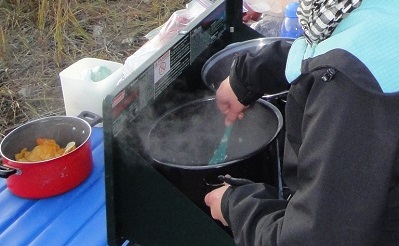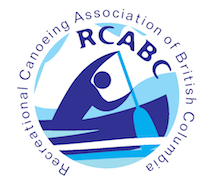
While canoeing and camping, there are many bacteria and viruses transmitted by humans that can make your trip grueling or even cause serious long-term illness. Some of these parasites are highly contagious and if you go on a long trip they can spread through your group very quickly. Good Hygiene can control the spread of viruses, parasites and bacteria. A good wilderness first aid course can help with understanding and treatment.
FOOD SAFETY AND HYGIENE TOPICS:
Salmonella, E.Coli and Toxoplasmosis are examples of fecal contamination diseases that live in the intestines of animals and people. The risks can be greatly reduced by good hygiene, proper cooking and storage of food. Some of these diseases can be transmittable from human to human, but the most common reason for infection is:
- Eating raw or undercooked meat
- Improper food preparation & cooking
- Contaminating cooked food with:
- Raw or undercooked meat
- Dirty hands & utensils
- Dirty food preparation surfaces
Canoeing allows you to carry enough gear to make good cleaning, hand washing and dishwashing much easier than other types back country recreation such as hiking. Carrying several small wash basins and using soap & water with clean water rinse is the best way to avoid contamination.
Water-borne illnesses are in fresh water (rivers and lakes) contaminated with animal or human feces. Examples are Beaver Fever (Giardiasis) and Cryptosporidiosis. They are sometimes short lived but they can also lead to long term health problems. Sadly, almost all water in BC is now suspect. Many people in BC will now avoid drinking even out of high elevation alpine streams due to the extent of our presence in the backcountry, including our dogs who transmit these diseases.
- When going on multi-day canoeing trips it is very important to consider your water supply. Will you need to carry water or collect it along the way?
- If you are unsure of the water quality and supply, carry lots of water with you.
- Look for small, clear tributaries to collect water, especially when on silty rivers.
- If water is contains a lot of silt it is a higher health risk because parasites attach themselves to the dirt particles.
- Silty or cold water takes longer to treat.
- Learn about what kind of activities may impact water quality upstream, such as agriculture or other human development.
- Make sure your filtration or treatment system is in good working order.
- Bringing water to a rolling boil for a few minutes is one of the most effective ways to kill parasites in the water.
- Feces from yourself or your dog are a contamination source and should be buried well away from water or better, carried out.
Proper hygiene, particularly hand washing greatly reduces the risk of transmission of most diseases. Follow these guidelines and you'll reduce the risk of illness during your trip.
- Plan ahead and prepare.
- Create a washing station with soap and water near the latrine or toilet area.
- Wash your hands regularly.
- If you can’t was regularly, use a hand sanitizer with at least 60% alcohol, and use lots of it!
- Hand sanitizer is less effective than soap and water, particularly for viruses. If your hands are visibly dirty always wash them with soap and water.
- If you're already sick either don't go or ask your trip mates how they feel about you coming.
Other diseases can occur and spread during an extended canoe trip. If someone comes with a cold or flu or develops one during the trip, the rest of the party will have to use strict hygiene measures such as hand washing in order to stop it from spreading. See the Environment section on Wildlife Safety and Diseases for information on other diseases.
FIRST AID
When embarking on an extended and remote canoe trip it is important to have a good first aid kit along and someone that is trained in Wilderness First Aid. There are many good First Aid organizations that offer weekend, 40 hour and 80 hour WFA courses. Before taking a course be certain of what your needs are (how long a course you should take), particularly if you are leading or guiding. Also make sure that there are instructors in your area so you can recertify easily without having to travel.
OTHER INFORMATION
The BC Center for Disease Control is an interesting source of information for current trends and outbreaks in BC.



















